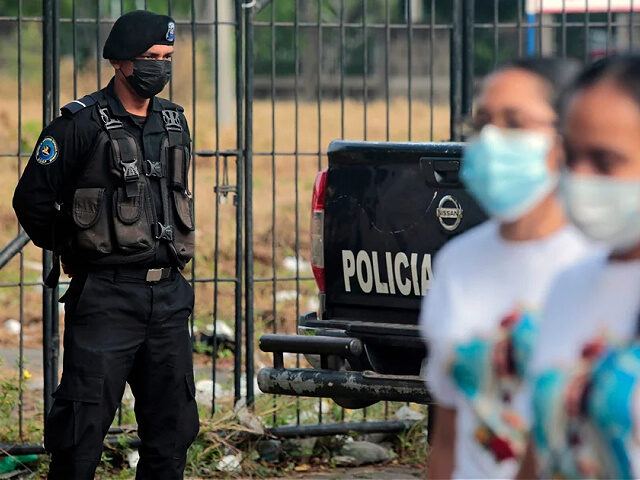The socialist regime of Nicaragua has doubled down on its fierce campaign against the Catholic Church in the nation throughout August by arresting members of the church and indiscriminately closing down Catholic radio stations throughout the country.
The Church has long stood as a bastion of opposition to Nicaraguan dictator Daniel Ortega; throughout the past month, Ortega has exacerbated repression to curb any and all opposition to his Sandinista regime.
The delicate situation ramped up on August 6, when Nicaragua’s police announced that it opened an investigation into the nation’s Catholic leadership for allegedly inciting violent acts with the intention of destabilizing the country and the ruling socialist regime. The announcement came hours after Rosario Murillo, Nicaragua’s vice president and dictator Ortega’s wife, had accused Bishop of Matagalpa Rolando Álvarez of having committed “sins against spirituality,” due to his outspoken criticism of the Sandinista regime.
Following the announcement, Nicaragua’s police raided the bishop’s parish. Álvarez was forced to remain holed up in his residence, preventing the bishop from officiating Mass.
On August 19, the Ortega regime conducted a raid on Álvarez’s home and arrested the bishop alongside seven other members of the Catholic church who had been staying in Álvarez’s residence for two weeks. The Ortega regime then placed the Bishop on house arrest and accused him of “organizing violent groups” and incitement “to carry out acts of hate against the population.”
Álvarez is the first bishop that Ortega has detained since his return to power in 2007.
Se dice que una imagen es mejor que mil palabras.
Así esta la Iglesia Católica en #Nicaragua pic.twitter.com/XUpD4DMjxc— Tifani Roberts (@TifaniRoberts) August 17, 2022
The auxiliary Bishop of Managua Monsignor Silvio Báez, who fled Nicaragua in 2019 at the request of Pope Francis due to threats made to his personal security, made calls for the liberation of his peers at a Sunday Mass held in the city of Miami.
“You have to ask for freedom. You don’t have to negotiate with the person. You have to ask for freedom, because they are innocent,” Báez said.
Following the arrest of Bishop Álvarez, the Diocese of Estelí sent a public letter to Ortega in which it denounced the persecution that it is being subject to while asking for the liberation of Álvarez and to be allowed to work in peace.
“We call on you to convert and to stop hassling us. Let us work in peace! Release the bishop, the priests, and the laity and the Lord will have mercy on you, if you convert from the heart,” the letter dated August 23 reads.
Pope Francis expressed his concern regarding the Catholic Church’s situation on Sunday without directly mentioning the arrest of Bishop Álvarez.
“I closely follow with concern and pain the situation that has been created in Nicaragua that affects people and institutions,” the pope said. “I would like to express my conviction and my desire that through an open and sincere dialogue the bases can be found for a respectful coexistence and peaceful.”
The relationship between the Ortega regime and Nicaragua’s Catholic Church had deteriorated in 2018 amid the intense protests against the Ortega regime that took place that year. The Ortega regime — which has systematically curbed dissent and political opponents, engaged in gross human rights violations, and held absurdly rigged sham elections — responded to the protests by carrying out a brutal crackdown, with more than 300 reported dead and thousands imprisoned.
The protesters, who called for freedom and for the removal of the Sandinista regime that has ruled Nicaragua for almost all of the past four decades, counted on the support of the local Catholic Church, whose leaders also acted as mediators. Ortega responded by branding the church mediators as “terrorists.”
According to 2005 census data, 59 percent of Nicaragua’s 6 million population is Catholic.
Tensions between the Catholic Church and the Ortega regime worsened in March 2022 after Ortega declared the papal nuncio “persona non grata,” banishing Archbishop Waldemar Stanislaw Sommertag from Nicaragua. The Vatican responded through a communique dated March 12, in which it described the move as “incomprehensible.”
Following the banishment of the papal nuncio, the Ortega regime began to forcefully shut down Catholic media outlets in Nicaragua, starting with the shutdown of the Church’s Canal Católico television channel in May 2022. The move prompted the Organization of American States (OAS) to urge the Ortega regime to stop its persecution of the Catholic Church. Nicaragua, which had announced its withdrawal from the OAS in November 2021, had just expelled all OAS representatives from the country in April 2022, forcing an early withdrawal of the organization.
The closure of the Canal Catolico television channel was followed by the closure of the Catholic television channels TV Merced and San José in June.
On August 1, the Ortega regime closed down seven Catholic Radio Stations in a single day: Radio Hermanos, Radio Santa Lucía, Radio Católica, Radio Nuestra Señora de Lourdes, Radio Nuestra Señora de Fátima, Radio San José de Matiguás, and Radio Monte Carmelo.
On Wednesday, the Ortega regime closed down the Catholic radio station Radio Stereo Fe of the Diocese of Estelí, the latest Catholic radio station that has been closed down in Nicaragua.
The Ortega regime claims that Radio Santa Fe was closed down due to irregularities in its broadcast license. Not renewing broadcast licenses or rescinding them over technicalities is a tried and true tactic that far-left regimes have employed in Latin America to close down media outlets while maintaining plausible deniability. One of the most emblematic examples in the region being the shutdown of Venezuela’s RCTV news channel, an outspoken critical channel of Hugo Chávez and his socialist revolution, which was forcefully shut down after being on air for 53 years due to Chávez not renewing their broadcast license.
Christian K. Caruzo is a Venezuelan writer and documents life under socialism. You can follow him on Twitter here.

COMMENTS
Please let us know if you're having issues with commenting.